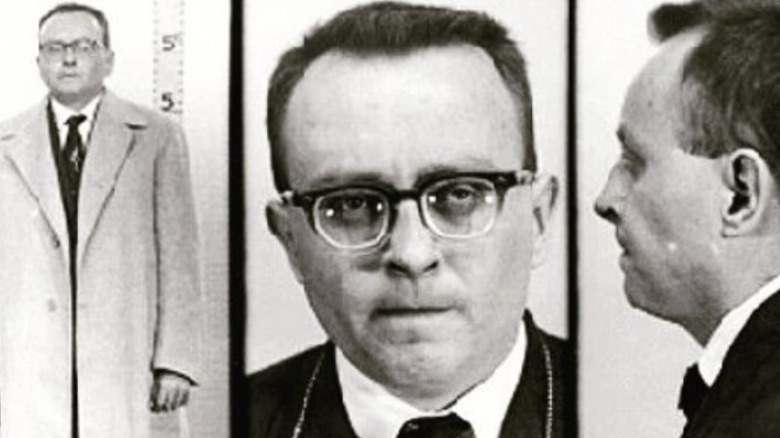Why Killer Victor Feguer Oddly Requested A Single Olive Before His Execution
The Marshall Project writes that in the United States, prisoners on death row are sometimes granted the right to choose their method of execution, their last words, and most notably, their last meal. For many, these final meals are a source of morbid fascination. Michael Owen Jones, a professor emeritus from the University of California, Los Angeles, explained why to The New York Times. He said that it gives rise "to think about one's own last meal and what it would consist of, wondering what if anything could be inferred about the personality of the executed person from the requested final meal."
In 1963, the state of Iowa hanged Victor Feguer, a 27-year-old man from Michigan who chose an olive as his final meal (via the Los Angeles Times). According to Fox News, Feguer had been a criminal for most of his life. In 1951, he was arrested for burglary and sent to prison. Upon his release in 1960, Feguer went on to commit the crime that led to his death. Feguer, per the Telegraph Herald, traveled to Dubuque, Iowa with a handgun in July of that year. There, he called Dr. Edward Bartels, a name he found in a local phone book. Feguer's wife was sick, he told Dr. Bartels, and needed to be seen. Feguer did not have a wife.
Victor Feguer didn't want to die
The Telegraph Herald writes that Dr. Bartels drove to Feguer's location. Feguer (above) then took out his gun and forced Dr. Bartels to drive to Illinois. Per Fox News, Feguer ended up shooting Dr. Bartels in the head and dumping the body in a field. It's believed that Feguer wanted drugs and when the doctor didn't oblige with his request, he killed him (via ABC News). Feguer took the doctor's car and drove to Birmingham, Alabama. He tried to sell the car but was instead caught by the FBI. Although the car, the murder weapon, and Dr. Bartel's body were all found, Feguer claimed that he was innocent and that someone else had murdered the doctor.
According to the Los Angeles Times, Feguer was quickly convicted and sentenced to death for kidnapping and murder. Fox News reports that his legal team attempted to convince the jury that Feguer was too mentally ill to stand trial. The publication states that he was a sociopath, among other things. Moreover, he never spoke about the crime to his lawyers and accepted that he was going to die. But as the date approached, Feguer had a change of heart. Meanwhile, his lawyers tried but failed to appeal his sentence.
This prompted then-Governor Harold Hughes to call and ask President John F. Kennedy to grant Feguer a reprieve (per the Telegraph Herald). Kennedy looked over the case and wrote (via ABC News), "The petition should be and is hereby denied."
Victor Feguer's symbol of peace
Per ABC News, Feguer spent his final days on death row at the Iowa State Penitentiary. The night before his execution, a guard noted that he was "calm, cooperative and resigned." Feguer also ate his final meal: one olive with a pit (via 9News). The Los Angeles Times reported that Feguer stated that he wanted the "fruit of the tree of peace" to emerge from his grave. Although Fox News writes that Feguer did not speak at his execution, his last words before his death were reportedly, "I sure hope I'm the last one to go."
On March 15, 1963, Victor Feguer was hanged (per the Los Angeles Times). According to ABC News, he is buried in an unmarked grave in a cemetery in Fort Madison, Iowa. He was also the last individual to be federally executed until the 2001 execution of convicted Oklahoma City bomber Timothy McVeigh (via the Independent).
Years after his death, photographer Henry Hargreaves chose to include Feguer's last meal in his "No Second" series about the last meals of death row inmates (per CBS News). Hargreaves said, "It's just such a polarizing image. We think about last meals, and is it something that's going to be totally gluttonous, and then he just has a single olive." He added, "You know, it's so simple, beautiful and kind of final. It's like a full stop at the end of his life."


